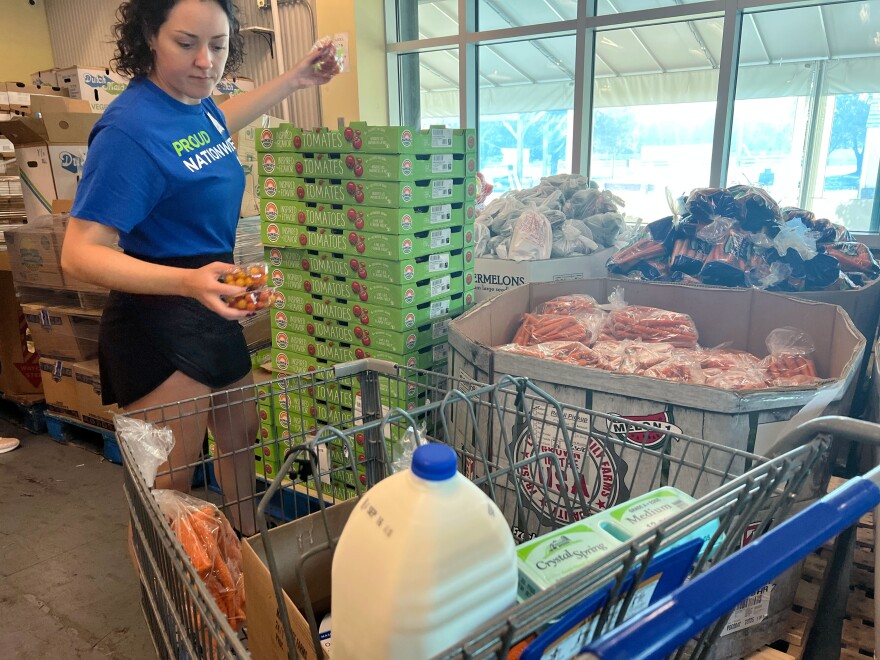The Farm Bill is a massive bill package passed by Congress every five years. It shapes the country's entire food system. It funds agricultural programs and commodities, provides support for sustainable farming research and also funds crop insurance.
Three quarters of it funds food nutrition programs that serve food banks, low income families and seniors.
It’s also up for renewal next year and groups from across Ohio — including food banks, food access advocacy groups, farmers, manufactures and economists — want to see several more sustainable food systems investments that work for all Ohioans.
U.S. Sen. Sherrod Brown (D-OH) — who’s in the Senate Agriculture Committee — stopped by and met with groups to talk about what they want to prioritize on the farm bill.
Brown said he knows many Ohioans are still feeling the effects of the pandemic, and Congress can do more to support food access for families who need it.
“The farm bill, if done right, will focus on local foods without the transportation costs and moving around the country, getting local foods, fresher foods, more nutritious foods on people's tables,” he said. “It will increase the prosperity of rural Ohio, which is always struggling, and it will obviously help those families.”
Lisa Hamler-Fugitt, the executive director of the Ohio Association of Food Banks, said she wants to see legislators strengthen both local food systems and federal supplemental food programs in the state this round.
“If you want to be able to feed yourself and your family, to be able to have access to fresh, affordable sources of locally grown food, then the farm bill is where you need to be at,” Hamler-Fugitt said. “Hunger is not a partisan issue, nor should the farm bill be.”

Specifically, advocates want to see more support for programs like the Emergency Food Assistance Program (TEFAP). Through that program, the USDA purchases a variety of foods like fresh vegetables, meat and fish and shelf stable foods and distributes it to different organizations across the country.
Groups want to see increased funding for Farm to Food Bank programs — which funds projects that reduce waste at the food producer level and then pays for the cost of donating that food to food banks.
Advocates also said there needs to be more support to keep people from falling into a cycle of poverty and food insecurity. Lauren Tapple with the Dayton Foodbank Inc., said that means expanding eligibility for the Supplemental Food Nutrition Program (SNAP).
“Once you get a job, once you're making a certain level of income those benefits cease to exist because they are making a certain level of income and then those benefits go away and they can no longer afford groceries.”
Tappel is describing the benefit cliff. It means a positive change in someone’s personal finances could disqualify them from SNAP or other benefits when they’re still not financially stable to support the loss of those benefits.
In Ohio, over 1,500,000 people are enrolled in SNAP. Tappel said finding long term solutions for Ohioans enrolled in that program is something that still needs to be looked at.
“We talk about these different benefits and how to truly uplift people out of food insecurity, so what does that really look like? What does it look like if you are unemployed, if you are on disability. How do we really support those people?” Tappel said.
Hamler-Fugitt said she believes advocacy groups across the state can move the needle toward a more food secure Ohio. She added she’s looking forward to working with elected officials to make sure Ohio is leading the national conversation around ways to promote food security.
“Now's the time to bring attention to this. A lot of people want to put the economic woes in the rearview mirror. The pandemic is not over,” Hamler-Fugitt said. “So this is really an opportunity to bring to the forefront and prepare Congress for this really important task of the next farm bill.”
Alejandro Figueroa is a corps member with Report for America, a national service program that places journalists into local newsrooms. Support for WYSO's reporting on food and food insecurity in the Miami Valley comes from the CareSource Foundation.


